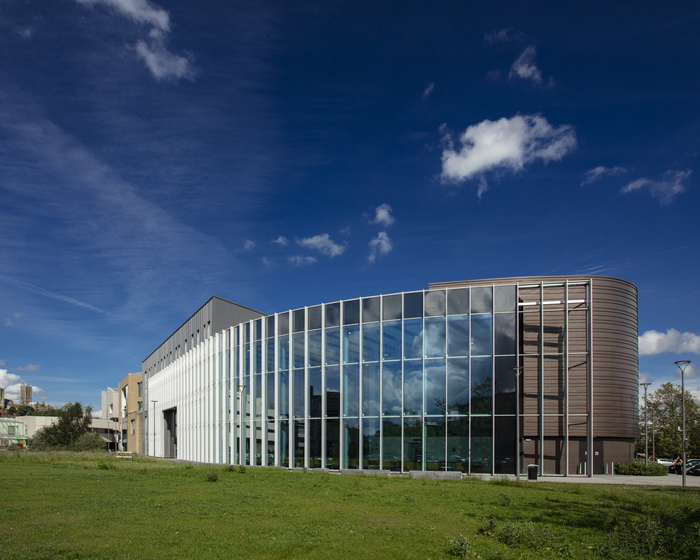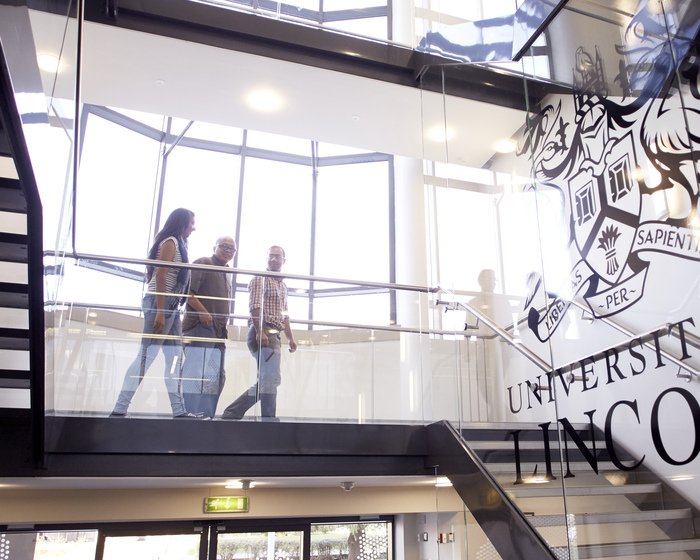/prod01/university-of-lincoln-cdn-pxl/media/responsive2017/images/course/coursebanner/Uni,062,16thDec2016,by,E,Egg,5ds_2440.jpg )
Science Foundation Year
Mathematics and Physic Programmes
Study Mathematics and Physics
Our School of Engineering and Physical Sciences is based in purpose-built facilities in the University's Isaac Newton Building, and offers a variety of courses across both disciplines.
Our Mathematics degrees aim to provide a fundamental education in mathematics, including pure and applied mathematics, while our Physics degrees combines fundamental and applied physics with rigorous mathematics and computational training. Our foundation year programmes provide an alternative entry route onto these full degree programmes.
Foundation Year Programmes (2025)
| Course Title | UCAS Code | Validation Status | Entry Requirements (A level) | Entry Requirements (BTEC) | Entry Requirements (T Level) | Additional Requirements (GCSE) |
|---|---|---|---|---|---|---|
| Mathematics with Science Foundation Year BSc | G101 | Validated | 64 UCAS Tariff points from a minimum of 2 A Levels | MPP (Merit, Pass, Pass) | Pass (D or E on the Core) | 3 GCSEs at grade 4(C) to include English and Maths |
| Physics with Science Foundation Year BSc | F301 | Validated | 64 UCAS Tariff points from a minimum of 2 A Levels | MPP (Merit, Pass, Pass) | Pass (D or E on the Core) | 3 GCSEs at grade 4(C) to include English and Maths |
| Mathematics and Theoretical Physics with Science Foundation Year BSc | GF14 | Validated | 64 UCAS Tariff points from a minimum of 2 A Levels | MPP (Merit, Pass, Pass) | Pass (D or E on the Core) | 3 GCSEs at grade 4(C) to include English and Maths |
| Mathematics and Theoretical Physics with Science Foundation Year MMath | GFC4 | Validated | 64 UCAS Tariff points from a minimum of 2 A Levels | MPP (Merit, Pass, Pass) | Pass (D or E on the Core) | 3 GCSEs at grade 4(C) to include English and Maths |
| Mathematics with Science Foundation Year MMath | G103 | Validated | 64 UCAS Tariff points from a minimum of 2 A Levels | MPP (Merit, Pass, Pass) | Pass (D or E on the Core) | 3 GCSEs at grade 4(C) to include English and Maths |
| Physics with Science Foundation Year MPhys | F304 | Validated | 64 UCAS Tariff points from a minimum of 2 A Levels | MPP (Merit, Pass, Pass) | Pass (D or E on the Core) | 3 GCSEs at grade 4(C) to include English and Maths |
| Mathematics with Philosophy with Science Foundation Year BSc | VG52 | Validated | 64 UCAS Tariff points from a minimum of 2 A Levels | MPP (Merit, Pass, Pass) | Pass (D or E on the Core) | 3 GCSEs at grade 4(C) to include English and Maths |
| Mathematics with Computer Science with Science Foundation Year BSc | GG15 | Validated | 64 UCAS Tariff points from a minimum of 2 A Levels | MPP (Merit, Pass, Pass) | Pass (D or E on the Core) | 3 GCSEs at grade 4(C) to include English and Maths |
| Mathematics with Computer Science with Science Foundation Year MSci | G105 | Validated | 64 UCAS Tariff points from a minimum of 2 A Levels | MPP (Merit, Pass, Pass) | Pass (D or E on the Core | 3 GCSEs at grade 4(C) to include English and Maths |
| Physics with Astrophysics with Science Foundation Year BSc | F318 | Validated | 64 UCAS Tariff points from a minimum of 2 A Levels | MPP (Merit, Pass, Pass) | Pass (D or E on the Core) | 3 GCSEs at grade 4(C) to include English and Maths |
| Physics with Astrophysics with Science Foundation Year MPhys | F312 | Validated | 64 UCAS Tariff points from a minimum of 2 A Levels | MPP (Merit, Pass, Pass) | Pass (D or E on the Core) | 3 GCSEs at grade 4(C) to include English and Maths |
| Physics with Philosophy with Science Foundation Year BSc | F3V6 | Validated | 64 UCAS Tariff points from a minimum of 2 A Levels | MPP (Merit, Pass, Pass) | Pass (D or E on the Core) | 3 GCSEs at grade 4(C) to include English and Maths |
| MPhys Physics with Philosophy with Science Foundation Year | VF54 | Validated | 64 UCAS Tariff points from a minimum of 2 A Levels | MPP (Merit, Pass, Pass) | Pass (D or E on the Core) | 3 GCSEs at grade 4(C) to include English and Maths |
Please note that English language requirements for International students can be found on the full degree course pages for each programme.
Some programmes may also be available for part-time study.
For information on any other qualifications, please contact admissions@lincoln.ac.uk.
Foundation Year Programmes (2026)
| Course Title | UCAS Code | Validation Status | Entry Requirements (A level) | Entry Requirements (BTEC) | Entry Requirements (T Level) | Additional Requirements (GCSE) |
|---|---|---|---|---|---|---|
| Mathematics with Science Foundation Year BSc | G101 | Validated | 64 UCAS Tariff points to include 32 points from a STEM subject | MPP (Merit, Pass, Pass) to include 32 points from a STEM subject | Pass (D or E on the Core) | 3 GCSEs at grade 4(C) to include English and Maths |
| Physics with Science Foundation Year BSc | F301 | Validated | 64 UCAS Tariff points to include 32 points from a STEM subject | MPP (Merit, Pass, Pass) to include 32 points from a STEM subject | Pass (D or E on the Core) | 3 GCSEs at grade 4(C) to include English and Maths |
| Mathematics and Theoretical Physics with Science Foundation Year BSc | GF14 | Validated | 64 UCAS Tariff points to include 32 points from a STEM subject | MPP (Merit, Pass, Pass) to include 32 points from a STEM subject | Pass (D or E on the Core) | 3 GCSEs at grade 4(C) to include English and Maths |
| Mathematics and Theoretical Physics with Science Foundation Year MMath | GFC4 | Validated | 64 UCAS Tariff points to include 32 points from a STEM subject | MPP (Merit, Pass, Pass) to include 32 points from a STEM subject | Pass (D or E on the Core) | 3 GCSEs at grade 4(C) to include English and Maths |
| Mathematics with Science Foundation Year MMath | G103 | Validated | 64 UCAS Tariff points to include 32 points from a STEM subject | MPP (Merit, Pass, Pass) to include 32 points from a STEM subject | Pass (D or E on the Core) | 3 GCSEs at grade 4(C) to include English and Maths |
| Physics with Science Foundation Year MPhys | F304 | Validated | 64 UCAS Tariff points to include 32 points from a STEM subject | MPP (Merit, Pass, Pass) to include 32 points from a STEM subject | Pass (D or E on the Core) | 3 GCSEs at grade 4(C) to include English and Maths |
| Mathematics with Philosophy with Science Foundation Year BSc | VG52 | Validated | 64 UCAS Tariff points to include 32 points from a STEM subject | MPP (Merit, Pass, Pass) to include 32 points from a STEM subject | Pass (D or E on the Core) | 3 GCSEs at grade 4(C) to include English and Maths |
| Mathematics with Computer Science with Science Foundation Year BSc | GG15 | Validated | 64 UCAS Tariff points to include 32 points from a STEM subject | MPP (Merit, Pass, Pass) to include 32 points from a STEM subject | Pass (D or E on the Core) | 3 GCSEs at grade 4(C) to include English and Maths |
| Mathematics with Computer Science with Science Foundation Year MSci | G105 | Validated | 64 UCAS Tariff points to include 32 points from a STEM subject | MPP (Merit, Pass, Pass) to include 32 points from a STEM subject | Pass (D or E on the Core | 3 GCSEs at grade 4(C) to include English and Maths |
| Physics with Astrophysics with Science Foundation Year BSc | F318 | Validated | 64 UCAS Tariff points to include 32 points from a STEM subject | MPP (Merit, Pass, Pass) to include 32 points from a STEM subject | Pass (D or E on the Core) | 3 GCSEs at grade 4(C) to include English and Maths |
| Physics with Astrophysics with Science Foundation Year MPhys | F312 | Validated | 64 UCAS Tariff points to include 32 points from a STEM subject | MPP (Merit, Pass, Pass) to include 32 points from a STEM subject | Pass (D or E on the Core) | 3 GCSEs at grade 4(C) to include English and Maths |
| Physics with Philosophy with Science Foundation Year BSc | F3V6 | Validated | 64 UCAS Tariff points to include 32 points from a STEM subject | MPP (Merit, Pass, Pass) to include 32 points from a STEM subject | Pass (D or E on the Core) | 3 GCSEs at grade 4(C) to include English and Maths |
| MPhys Physics with Philosophy with Science Foundation Year | VF54 | Validated | 64 UCAS Tariff points to include 32 points from a STEM subject | MPP (Merit, Pass, Pass) to include 32 points from a STEM subject | Pass (D or E on the Core) | 3 GCSEs at grade 4(C) to include English and Maths |
How You Study
Students on all foundation programmes study a combination of core and subject specific modules during the first year as part of an integrated degree programme. The combination of modules studied is tailored to the needs of the full degree programme that students wish to progress onto after successful completion of the foundation year.
Following successful completion of the Science Foundation Year, students will then progress onto the first undergraduate year of their chosen degree programme. This means students will study for a total of four years for a standard degree, or five years if they take an integrated Master’s degree. Students’ final awards upon graduating will reflect the full course title, for example “BSc Physics with Science Foundation Year”. Course specific information on the full degree programmes within the School of Engineering and Physical Sciences can be found on our course pages.
How You Are Assessed
The way students will be assessed on the foundation year will vary for each module. It could include coursework, such as a lab report or essay, an end of year synoptic assessment, portfolio development, group work or presentations to name some examples.
Having not achieved the A Levels I anticipated, I thought that my academic future was over, but the Science Foundation Year was another chance for me to continue my education.
Shanice Wareing
BSc (Hons) Physics with a Foundation Year graduate


